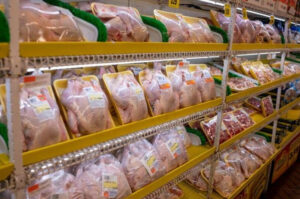INVENTORY levels of dressed chicken rose in the second week of June, with imports accounting for most of the total, the National Meat Inspection Service (NMIS) said.
The NMIS said dressed chicken in cold storage as of June 12 hit 61,006.94 metric tons (MT), up 1.46% from a week earlier.
On a month-on-month basis, inventory rose 25.34%.
Imports accounted for 37,487.88 MT of the dressed chicken inventory while domestically grown poultry totaled 23,519.05 MT.
The NMIS noted that the report does not include fresh chilled chicken and mechanically deboned meat.
Cold storage facilities in Central Luzon had 17,699.97 MT or 29.01% of the total. This was followed by Calabarzon (16,790.69 MT), and the National Capital Region (8,856.34 MT).
“Supply continues to outstrip low demand conditions. Current inventory of imports is more than double of last year,” Elias Jose M. Inciong, president of the United Broiler Raisers Association, said in a Viber message.
“This is concerning as it is indicative of both poor demand and displacement caused by imports,” he added.
The inventory of frozen pork during the period was 74,916.09 MT, up 6.30% from a week earlier. This was up 53.92% month on month.
Imports accounted for 70,534.63 MT, while domestically grown pork in cold storage totaled 4,381.46 MT, according to the NMIS.
The pork inventory in Calabarzon represented 21,837.7 MT or 29.14% of the total, followed by Central Luzon (17,058.59 MT) and the NCR (14,836.3 MT).
Alfred Ng, vice-president of the National Federation of Hog Farmers, Inc., said that the volume of imports has “caused the liveweight price to drop continuously, and at a much faster rate than retail prices.”
“As consumers still do not have disposable income to increase their pork consumption, market vendors are keeping their prices high to compensate for the lower volume of purchase to be able to earn enough for their families’ needs,” he said via chat.
“Other big integrator farms have also increased their hog production so local production is also more than enough to supply the market,” he added. — Sheldeen Joy Talavera

